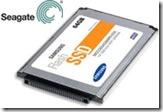
Which Solid State Hard Drive should I buy?
 Not all SSDs(Solid State Drives) give the same performance so here are some good and bad, listed by controller chip used plus drives that use the controller.
Not all SSDs(Solid State Drives) give the same performance so here are some good and bad, listed by controller chip used plus drives that use the controller.
Best SSDs to buy
These are all known good SSDs that give reasonably high performance and are resilient to performance degradation. The most popular ones are listed first.
DISCLAIMER: This is just a list for performance. If you want a problem free drive the best choice would probably be the older generation Intel G2 (purchased new). New Intel 320 has a firmware bug. New SandForce drives ALWAYS have firmware bugs. Heck, older SandForce still have firmware bugs (AFAIK occasional wake from S3 bug was not 100% fixed). And of course OCZ drives should always make the buyer wary, due to the volume of complaints. Also, most (but not necessarily all) problems are discovered and fixed within the first 6 months of the release of a drive model. If you don’t want to pay to be a beta tester, don’t buy a drive that is brand new on the market.
SandForce SF2200/SF2500 series controller based drives
OCZ Vertex 3, Vertex 3 Pro, Agility 3, Solid 3
OWC Mercury Extreme Pro 6G
Corsair Force Series 3, Force GT
Marvell controller based drives
Micron C400
Crucial m4
Micron C300
Crucial RealSSD
Intel 510
Plextor PX-M2
Corsair Performance 3
Intel controller based drives (oldest G1 doesn’t have Trim support)
Intel 320
Intel 311 (Larsen Creek, AKA the 20GB SLC for SSD caching)
Intel 310 (mSATA form factor)
Intel X18-M, X25-V and X25-M (look for “G2” after capacity in part number)
A-Data ASINTS series (Intel G2)
Kingston 40GB V Series (pseudo G2, no Trim firmware from Kingston but may be capable of cross-flashing Intel firmware with Trim)
Intel X18-M, X25-M and X25-E (look for “G1″ after capacity in part number)
Kingston SSDNow M series and E series (straight rebrands of Intel G1 drives?)
Dane Elec SSD kits (uses Intel X18-M and X25-M G1 drives)
SandForce SF1200/SF1222/SF1500 controller based drives
(Currently one of the top controllers to get, yes Trim is supported, very good on compressible data)
OCZ Vertex 2, Agility 2, Vertex LE, Vertex 2 Pro, Colossus 2
Corsair Force
OWC Mercury Extreme
Mushkin Enhanced Callisto Deluxe
Mushkin Enhanced Callisto DX2 (uncapped IOPS version?)
G.Skill Phoenix, Phoenix Evo, Phoenix Pro, Sniper Gaming
Patriot Inferno
A-DATA S599
Micro Center G2 Series (A-DATA S599 rebrand)
Indilinx Martini controller
OCZ Vertex Plus
Samsung 2nd gen controller based drives
Samsung 470 series
Corsair P256
Toshiba T6UG1XBG controller
(Trim is supported, very aggressive garbage collection so works well with OS or controllers that don’t support Trim)
Kingston SSDNow V+100 series (note the + in name, different controller than V 100, newer firmware than older V+)
Kingston SSDNow V+180 (1.8” version)
Kingston SSDNow V+100E (full disk encryption)
Best SSDs to buy for operating systems that do not have Trim support –
This means YOU with the WinXP/OSX/etc
(Trim currently requires Windows 7 and a SATA controller that supports AHCI mode)
Kingston SSDNow V+100 (Toshiba T6UG1XBG, same as Macbook Air)
Intel SSDs
Sandforce controller SSDs
Not as good SSDs to buy
Not as good as the best, but still better than spindle drives and decent choices if price is right. Translation: If it is significantly cheaper than the “good” SSDs.
Indilinx Barefoot controller (DEMOTED – was good except newer controllers got better)
OCZ Vertex, Agility, Solid 2, Vertex Turbo, Agility EX, Vertex EX, Vertex Mac Edition, Colossus, Z-Drive, Colossus LT
Patriot Torqx
Super Talent UltraDrive ME, GX, LE
Corsair Nova, Extreme
Crucial M225
G.Skill Falcon, Falcon II
Imation M-Class
A-Data Nobility
newer Jmicron controller (JMF618/612)
WD Silicon Blue
A-DATA S596 Turbo
Patriot TorqX TRB (JMF616, 32MB version half channels/writes)
Kingston SSDNow V series (JMF618, except 30GB model)
Kingston SSDNow V 100 series (JMF618, no + in name)
Toshiba T6UG1XBG controller (maybe a rebranded “new” Jmicron)
Kingston SSDNow V+ series
Kingston SSDNow V series 30GB (only this size)
newer Samsung RBB controller
(mediocre performance, hit/miss on Trim support)
Samsung PM800, SS805
OCZ Summit
Super Talent MasterDrive SX
Kingston SSDNow V+ series (older ones)
Corsair P series
Phison
Patriot TorqX 2
Patriot PS-100
Do not buy
Indilinx Amigo controller
(slow/crippled version of Indilinx Barefoot controller, meant to be really inexpensive not really fast, regular Indilinx got demoted so Amigo gets demoted too)
OCZ Onyx
older Jmicron controller (JMF602, JMF602B, JMF602B x2)
(huge performance problems, no Trim, terrible random writes)
OCZ Core, Apex, Solid, Core V2
Super Talent MasterDrive RX, PX, OX
G.Skill Titan
Kingston SSDNow V series (older ones)
older Samsung controller
(just bad performance all-around, no Trim)
many OEM SSDs found in name brand notebook computers in years past
Samsung FlashSSD
Corsair S series
G.Skill FlashSSD
Plextor (except latest PX-M2)
PCIe card SSDs
These get their own section for now. They come with some caveats that they are incompatible with some motherboards, and of course can’t be used in a notebook. However, if you are looking for huge capacities with huge performance and have the huge wallet to afford them, these are the ones to get.
OCZ RevoDrive (PCIe x4, twin SandForce 1200 in internal RAID)
OCZ RevoDrive 2 (PCIe x4, quad SandForce 1200 in internal RAID)
OCZ Z-Drive (PCIe x8, quad Indilinx Barefoot in internal RAID)
OCZ Z-Drive R2 (PCIe x8, eight Indilinx? Barefoot? in internal RAID, using removable NAND modules that look like SODIMMs)
OCZ IBIS (PCIe x4-to-HSDL controller, basically HSDL is like a PCIe x4 connector using a cable, the “drive” is a quad SandForce 1200 in internal RAID that looks like a normal 3.5″ HDD with an HSDL connector)
Related Links: Top 20 Most Popular Solid State Hard Drive on Amazon.com

 August 12, 2010 – Seagate Technology and Samsung Electronics Co., Ltd., announced that they have entered into a joint development and licensing agreement.
August 12, 2010 – Seagate Technology and Samsung Electronics Co., Ltd., announced that they have entered into a joint development and licensing agreement.